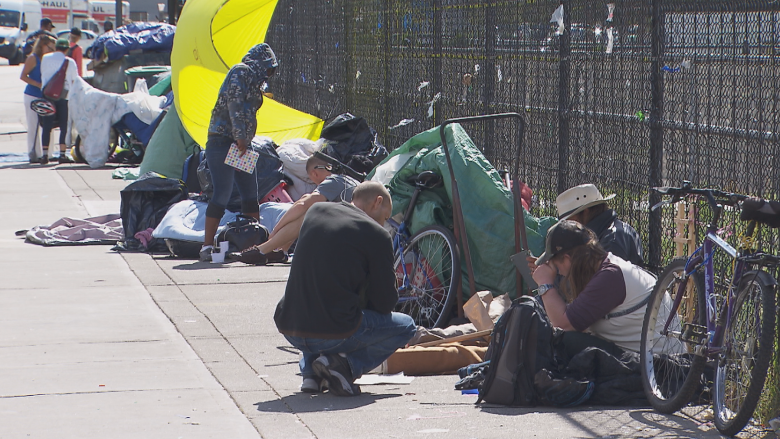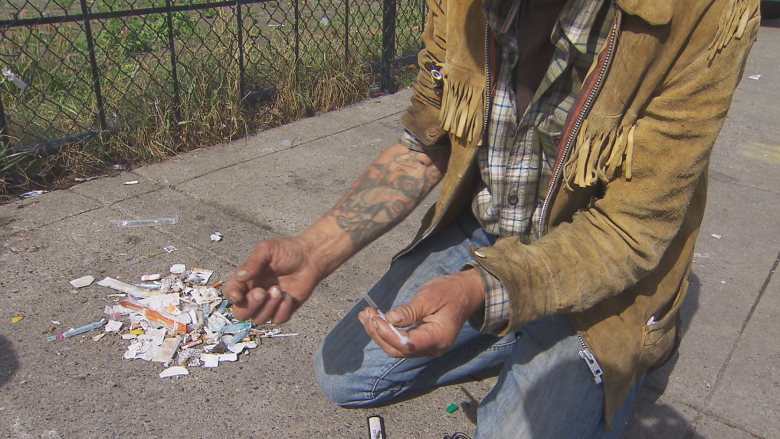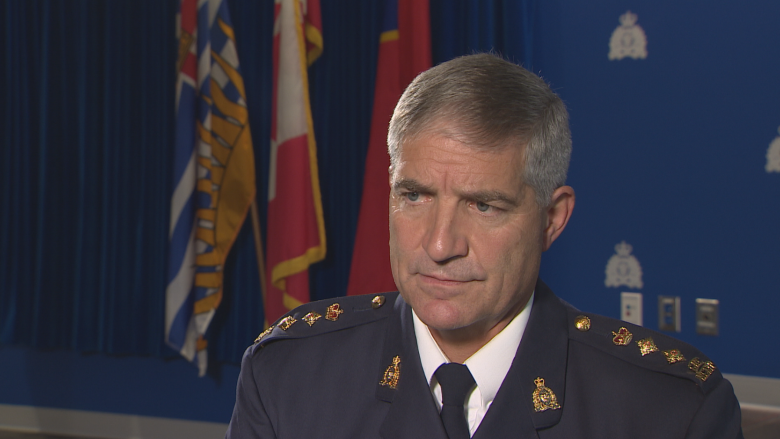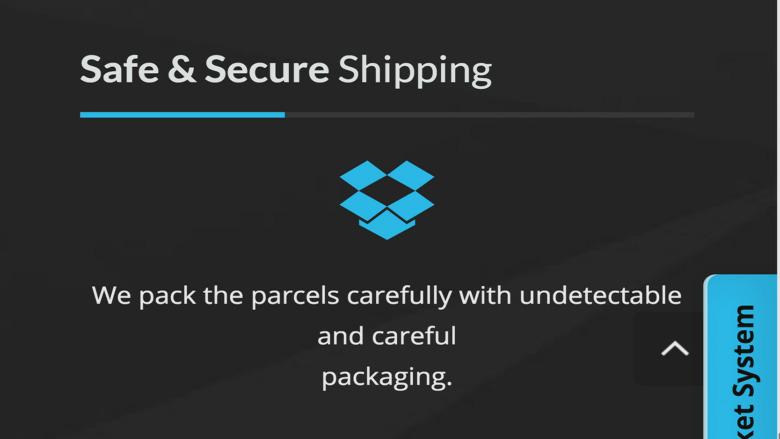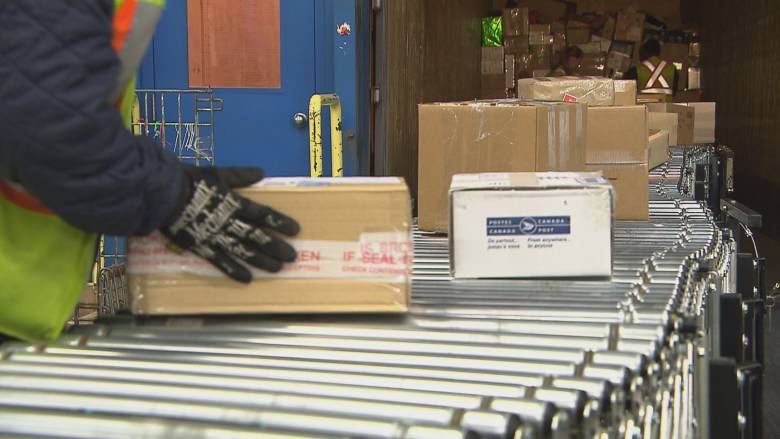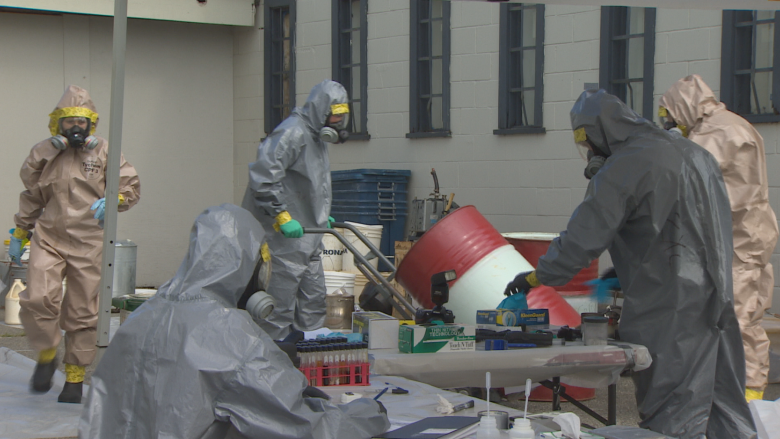'Too toxic to touch': Police struggle to deal with fentanyl
CBC recently spent a sunny September morning zigzagging along the front line of B.C.'s fentanyl crisis. To see what police are up against, we were given rare access to an RCMP street patrol on Surrey's infamous "strip."
Every few metres, a person with addictions was huddled under plastic sheets or tattered sleeping bags.
Among the filth and squalor were scores of needle caps and spent syringes, evidence of rampant drug use.
Const. Josh Waltman and Sgt. Trevor Dinwoodie of the Surrey RCMP's community response unit moved among the residents, checking to see who has overdosed — and who might have died — overnight.
"G'morning, Bonny!" Waltman calls across to a middle-aged woman.
"How's it going? Any ODs that you're aware of?"
Bonny remembers a particularly bad day recently.
"It got pretty freaky. Four of them in one day was just too much," she said. But, she says, no one died overnight.
Turns out she's wrong.
One of many overdoses
Down the road, the officers came across Justin — a clean-cut heroin addict who looks younger than his 35 years, except for the small open sores on his face.
"My friend's wife just died last night," he quietly tells the police. "I just found out this morning. They found her outside the door, dead."
The unnamed woman was another overdose death in B.C., one of as many as 800 being projected for this year. The majority are being blamed on fentanyl.
Drug gangs are sneaking the cheap and powerful synthetic opioid into street drugs such as heroin and cocaine, because of its powerful kick and low cost.
During a four-week period this summer, Insite, Vancouver's safe injection site, found 86 per cent of street drugs tested contained fentanyl.
Potent punch
Unsuspecting users are vulnerable to its potent punch because it's often inconsistently mixed with other drugs, creating "hot spots" that can kill.
Const. Waltman and Sgt. Dinwoodie aren't arresting anyone for simple possession. They just want to encourage residents of the Strip to stay safe and call 911 if they run into trouble.
But they were no sooner out of sight, than an elderly man started cooking his drugs in a small metal cup, his needle at the ready.
Paul said his addiction makes him take the risk.
"In three months, I've OD'd twice," he said.
I asked him how he can be sure of what he's shooting up.
"You can't. There's no pharmacist here mixing it up. It's a bunch of guys sitting in a basement."
I questioned whether that was like putting a bullet in a gun and putting it to his head.
"It's putting five bullets in and having one empty [chamber]," he said. "Russian roulette in the worst degree."
Fentanyl a 'game-changer'
"It is simply alarming," said RCMP Chief Supt. Brian Cantera, one of B.C.'s top cops.
"[It's] certainly a game-changer in terms of public safety and the deaths associated to it."
He said policing has had to shift to deal with the fentanyl crisis.
"We're simply not going to arrest our way out of this problem. It's too big an issue. It comes back to a multi-pronged approach, a multi-pillar approach, where you talk about prevention, education, harm reduction and enforcement."
Ironically, it's enforcement that's perhaps the biggest challenge for police.
Fentanyl is highly concentrated. That makes it relatively easy to smuggle into Canada from source countries such as China and Mexico.
Instead of using large overseas shipping containers, drug importers can use small packages delivered by Canada Post or a courier service.
Online sellers promise 'undetectable' parcels
A simple online search of "buy fentanyl online" produces numerous sellers — including one foreign pharmacy that promises "100 per cent anonymity and privacy," and "undetectable" parcels packed "carefully with tungsten and carbon papers to skip through customs' X-ray machines…"
It's something police are powerless to stop.
"I feel that it obviously creates a great deal of challenges," says Chief Supt. Cantera. "We're certainly not going to change the internet."
Changes demanded to CBSA inspection process
B.C. Premier Christy Clark wants that porous postal route sealed shut.
When she created her task force on fentanyl in late July, she called on the Canada Border Services Agency to search small packages for fentanyl.
But the co-chair of her task force says that has yet to happen.
"We're still waiting for the federal minister of public safety to get back to us," says Clayton Pecknold, who is also B.C.'s director of police services. "We've asked very explicitly for new strategies to interdict fentanyl at the borders and to give the CBSA the tools they need."
In a statement to CBC News, the CBSA says it's looking at new ways to screen mail, but so far, hasn't changed its policy.
While it notes it has "the legislated authority under the Customs Act to open any packages entering Canada," in the case of suspicious packages under 30 grams, they currently "contact the importer to request permission to open the mail. If permission is denied, the mail is returned to the exporter."
'Too toxic to touch'
When law enforcement officials do find fentanyl, there's another problem.
One veteran drug officer, speaking on background, tells CBC News it's "too toxic to touch."
Vancouver police confirm clandestine lab teams in hazmat suits that once specialized in dismantling crystal meth labs are now being called in to handle fentanyl seizures.
The VPD says three B.C. police officers recently suffered overdose symptoms when seizing some fentanyl powder.
Both Vancouver police and the RCMP have announced plans to issue naloxone nasal spray — a powerful opioid antidote — to front-line officers and support staff.
"I think it makes our officers nervous" says VPD spokesman Brian Montague. "We could potentially have some serious problems on our hands."
Task force co-chair Clayton Pecknold knows there's more to be done to protect police and the public from the dangers of fentanyl.
"It's a No. 1 priority, there's no two ways about it," he says. "People are working flat out on this right now."
"We are looking under every rock for every possible way to deal with this issue."


